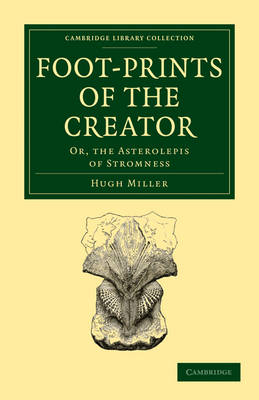
Footprints of the Creator
Or, the Asterolepis of Stromness
Seiten
2009
Cambridge University Press (Verlag)
978-1-108-00553-1 (ISBN)
Cambridge University Press (Verlag)
978-1-108-00553-1 (ISBN)
Footprints of the Creator (1849) describes Hugh Miller's reconstruction of the extinct fish he had discovered in the Old Red Sandstone and argues, on theological grounds, that their perfection of development disproved the Lamarckian theory of evolution and hence the thesis of Vestiges of the Natural History of Creation.
The geological writings of Hugh Miller (1802–56) did much to publicise this relatively new science. After an early career in banking in Scotland, Miller became editor of a newly founded Edinburgh newspaper, The Witness, in which he published a series of his own articles based on his geological research, a collection of which was issued as a book, The Old Red Sandstone, in 1841, and led to the Devonian geological period becoming known as the 'Age of the Fishes'. Footprints of the Creator (1849) described his reconstruction of the extinct fish he had discovered in the Old Red Sandstone and argued, on theological grounds, that their perfection of development disproved the current Lamarckian theory of evolution. The book, illustrated with woodcuts, was written partly as a response to the then anonymous Vestiges of the Natural History of Creation (1884), also reissued in this series.
The geological writings of Hugh Miller (1802–56) did much to publicise this relatively new science. After an early career in banking in Scotland, Miller became editor of a newly founded Edinburgh newspaper, The Witness, in which he published a series of his own articles based on his geological research, a collection of which was issued as a book, The Old Red Sandstone, in 1841, and led to the Devonian geological period becoming known as the 'Age of the Fishes'. Footprints of the Creator (1849) described his reconstruction of the extinct fish he had discovered in the Old Red Sandstone and argued, on theological grounds, that their perfection of development disproved the current Lamarckian theory of evolution. The book, illustrated with woodcuts, was written partly as a response to the then anonymous Vestiges of the Natural History of Creation (1884), also reissued in this series.
1. Stromness and its asterolepis; 2. The development hypothesis and its consequences; 3. The recent history of the asterolepis; 4. Cerebral development of the earlier vertebrata; 5. The asterolepis; 6. Fishes of the silurian rocks, upper and lower; 7. High standing of the placoids; 8. The placoid brain; 9. The progress of degradation; 10. Evidence of the silurian molluscs; 11. Superposition not parental relation; 12. Lamarckian hypothesis of the origin of plants; 13. The two floras, marine and terrestrial; 14. The development hypothesis in its embryotic state; 15. Final causes.
| Erscheint lt. Verlag | 20.7.2009 |
|---|---|
| Reihe/Serie | Cambridge Library Collection - Darwin, Evolution and Genetics |
| Zusatzinfo | Worked examples or Exercises |
| Verlagsort | Cambridge |
| Sprache | englisch |
| Maße | 140 x 216 mm |
| Gewicht | 420 g |
| Themenwelt | Naturwissenschaften ► Biologie ► Evolution |
| ISBN-10 | 1-108-00553-5 / 1108005535 |
| ISBN-13 | 978-1-108-00553-1 / 9781108005531 |
| Zustand | Neuware |
| Haben Sie eine Frage zum Produkt? |
Mehr entdecken
aus dem Bereich
aus dem Bereich
Wie die Vernichtung der Arten unser Überleben bedroht - Der …
Buch | Softcover (2023)
Penguin (Verlag)
15,00 €


